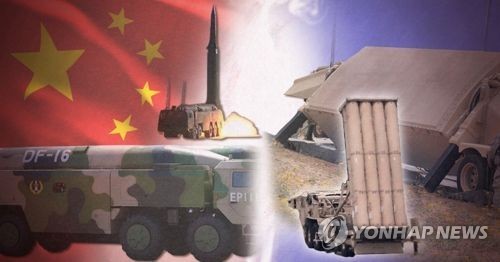South Korea should convince China to accept the ongoing deployment of an advanced US missile defense shield on its soil instead of trying to reverse the move, which could send the wrong signals to both Washington and Beijing, a scholar has said.
The installation of a Terminal High Altitude Area Defense battery has been under way at a former golf course in southeastern South Korea since early March.

Seoul and Washington say the move is aimed at better countering missile threats from North Korea, while China insists that it will hurt its strategic security interests and has taken what appear to be retaliatory steps against South Korean businesses.
In its May report on the North Korean economy, the state-run Korea Development Institute carried the scholar's claim made during a recent forum on South Korea's strategy to deal with the changing order in East Asia.
"The cancellation of the THAAD deployment could make China believe that South Korea is susceptible to outside pressure. It could send Washington a message that Seoul may not stand by it in a crunch," said Lee Sang-hyun, a senior researcher at the Sejong Institute in Seoul.
"South Korea has no choice but to take its time and persuade China over the need for the THAAD installment. It also needs to review Beijing's possible demands in order to help resolve the issue."
Specifically, Seoul and Washington should convince China that the allies will not push for an additional deployment of THAAD equipment, and that it is unrelated to America's broader missile defense system, Lee said.
China has taken apparently retaliatory measures against South Korea, including a ban on group tours to its neighbor. It has also closed several stores of Lotte Group, which provided the golf course in return for a military-owned land plot near Seoul.
Lee said South Korea should also make an effort to explore leverage against China by diversifying its diplomacy as it has learned the lesson the hard way that Seoul has no tools of its own to counter Beijing's retaliation.
During the campaign for the May 9 presidential election, South Korean President Moon Jae-in was critical of the decision to host THAAD, insisting that it was made without due process to collect public opinion. Presidential aides say the stance does not necessarily mean Moon is opposed to the deployment.
US President Donald Trump has fueled opposition to THAAD among the South Korean public by demanding the South pay for the $1 billion system. The demand runs counter to a deployment agreement in which the US agreed to pay for the system if the South agreed to host it and provide land.
At the forum, Jang Hyung-soo, a professor of Hanyang University in Seoul, predicted that China's rise will likely change the world economic order but Beijing may not outstrip Washington as the world's No. 1 economy at least by 2050.
"Both domestic and foreign media forecast China's economic size to overtake the US by 2030 several years ago, when China's economic growth hovered around 10 percent," Jang said. "Even under the most optimum conditions it will not be until 2035 and 2040 at the earliest that China becomes No. 1 and there is a low possibility of China outstripping the US overwhelmingly."
As of 2015, America's per capita gross domestic product came to $60,000, while the figure for the world's second-largest economy ranged from $7,000 to $8,000, he said, adding it would take at least 50 years for China's number to match half that of the US.
Meanwhile, Cho Nam-hoon, a researcher at the Korea Institute for Defense Analyses, predicted China may not be able to overtake the US in military power even after 2050. (Yonhap)







![[Graphic News] More Koreans say they plan long-distance trips this year](http://res.heraldm.com/phpwas/restmb_idxmake.php?idx=644&simg=/content/image/2024/04/17/20240417050828_0.gif&u=)
![[KH Explains] Hyundai's full hybrid edge to pay off amid slow transition to pure EVs](http://res.heraldm.com/phpwas/restmb_idxmake.php?idx=644&simg=/content/image/2024/04/18/20240418050645_0.jpg&u=20240419100350)





![[From the Scene] Monks, Buddhists hail return of remains of Buddhas](http://res.heraldm.com/phpwas/restmb_idxmake.php?idx=652&simg=/content/image/2024/04/19/20240419050617_0.jpg&u=20240419175937)

![[KH Explains] Hyundai's full hybrid edge to pay off amid slow transition to pure EVs](http://res.heraldm.com/phpwas/restmb_idxmake.php?idx=652&simg=/content/image/2024/04/18/20240418050645_0.jpg&u=20240419100350)

![[Today’s K-pop] Illit drops debut single remix](http://res.heraldm.com/phpwas/restmb_idxmake.php?idx=642&simg=/content/image/2024/04/19/20240419050612_0.jpg&u=)